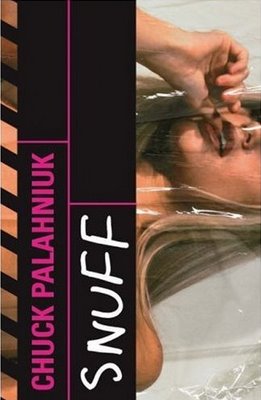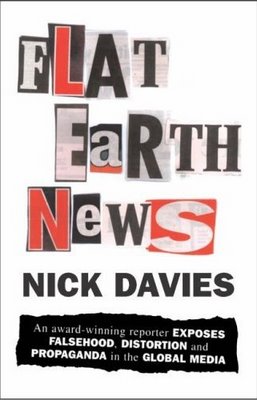Book review: Snuff by Chuck Palahniuk.
 Ever since Chuck Palahniuk (pronounced Paula-nick, fact fans) burst onto the literary scene in 1996 with the incendiary Fight Club, a novel which in just over 200 pages had more ideas than some authors have in an entire career, his star has waxed and waned appropriately. While Fight Club, with its tale of the crisis of masculinity, both warned of and mocked a world in which support groups for cancer sufferers had the monopoly on both self-improvement and emotional solidarity, where former followers and the atomised and abandoned subsequently turned to underground boxing clubs led by the charismatic Tyler Durden, the schizophrenic split personality of the unnamed narrator, which then gradually morphed into a fascist, autonomous anti-capitalist group set on destroying the banking records and bringing everyone back down to an equal zero was instantly translatable into a massively commercially and critically successful film, the possibilities of the rest of his early work, especially Survivor, remarkably similar to Fight Club, going the same way has gradually fallen away.
Ever since Chuck Palahniuk (pronounced Paula-nick, fact fans) burst onto the literary scene in 1996 with the incendiary Fight Club, a novel which in just over 200 pages had more ideas than some authors have in an entire career, his star has waxed and waned appropriately. While Fight Club, with its tale of the crisis of masculinity, both warned of and mocked a world in which support groups for cancer sufferers had the monopoly on both self-improvement and emotional solidarity, where former followers and the atomised and abandoned subsequently turned to underground boxing clubs led by the charismatic Tyler Durden, the schizophrenic split personality of the unnamed narrator, which then gradually morphed into a fascist, autonomous anti-capitalist group set on destroying the banking records and bringing everyone back down to an equal zero was instantly translatable into a massively commercially and critically successful film, the possibilities of the rest of his early work, especially Survivor, remarkably similar to Fight Club, going the same way has gradually fallen away. Although Choke, his ostensible fourth novel, has recently become a film, it's notable also as probably his weakest work, its narrative of a sexual obsessive who earns the money to pay for his sick mother's hospice treatment through tricking people into believing they've saved his life as he pretends to choke to death while eating in restaurants. The thinness of its strands perhaps lends itself to cinema because of the ease with which it can be filmed; something that can't be said for much else of his work.
Undoubtedly Palahniuk's second wind came with Haunted from 2005, a novel built around the conceit that the short stories within are the work of the participants on a literary retreat, getting away from it all to write their masterpieces. The often horrific and gruesome personal stories are tied together with a taut, increasingly absurdist narrative of their time in an old theatre, as the writers increasingly up the ante on their hosts, with the intention of emerging from the theatre at the end of their allotted time, scarred both mentally and physically but with an incredible story to tell that will ensure their financial and celebrity status until their deaths. A satire of reality television, celebrity culture and misery memoirs that takes the genre to its the obvious ultimate conclusion, that death, suffering and huge personal torment, regardless of their actual provenance are now increasingly what sells, it was the kind of work which despite its undoubted provocation simply ached to be both devoured and savoured. Including the infamous story "Guts", which purportedly led to a number of individuals fainting when Palahniuk read it at various sessions, it also features as its final entry "Obsolete", which is at least half the inspiration for the name of this very blog.
Palahniuk followed up Haunted with Rant, also known as Rant: An Oral Biography of Buster Casey. Written in the style of an oral history, a double-pun as Rant is "patient zero" of an especially virulent form of rabies and a reasonably transparent tribute to the works of both JG Ballard and David Cronenberg, it never quite reached the dizzy heights of Haunted, but its background of a dystopian America in which there are "Daytimers" and "Nighttimers" was filled in enough for those turned off by its denouement, where it's implied that Rant might the second coming, to be satisfied.
When the news came through that Palahniuk's next novel was to be set in the porn industry, on the set of an attempt to break the record for the number of sexual partners one woman has got through in an allotted time, it was hard not to be discouraged. Even by his generally high standards, to get anything out of such a restrictive setting, and from the three characters from whom the story emerges, three men lined up to take part in the record attempt was going to be difficult. It really did seem that Palahniuk was trying to live up to the criticism, where he increasingly broaches more and more lurid topics, to top each new degradation with something worse.
Snuff then is perhaps not as bad as it might well have been. Told from the perspective of three of the six hundred men Cassie Wright intends to have sex with in one session, each labelled by the wrangler Sheila, who also enters the narrative, we have Mr.72, the virgin who's grown up with Ms Wright's films, bought the plastic vagina and right breast modelled on her own and who's also convinced that he's the son whom Wright gave away; Mr.137, a former star on a prime-time detective show brought low by the revelation that he himself starred in a gang-bang porn film, albeit a gay one as the receiver, looking to restart his career by proving he isn't passive after all; and Mr.600, also known as Branch Bacardi, a celebrated "woodsman" long past his prime, whose relationship with Wright is as long as both their careers.
As always, Palahniuk has done his research. Annabel Chong, Jasmin St. Claire and Sabrina Johnson all feature, as do, as the pages turn, the Roman empress Messalina, Kegel exercises, Andrea Dworkin, Naomi Wolf, Ariel Levy, Catherine Blackledge and then actors and actresses that either suffered for their craft through injury or otherwise. The one thing that perhaps make you wonder whether this was a cynical, quick exercise is one obvious mistake, on a passage on how pornography and its users have been early adopters and influencers down the years, claiming that HD won the battle against Blu-ray for the world's dominant high-definition technology. As any geek will tell you, the opposite is the case, although the porn producers of America did mostly stump for HD. That error undermines the rest of the book's quick-fire, ratatat style synonymous with Palahniuk of producing "facts" along with the underlying narrative. It's impossible to check all the examples of the silent film actors who never appeared again due to their voices not being considered up to the task who are mentioned, of the tragedies that befell others due to the vagaries of production mistakes, but that one falsehood makes you wonder about the truthfulness of all the rest. That sloppiness previously wouldn't have happened.
Slow to start, despite its brevity, and with the puns and jokes on film titles parodied by porn producers quickly wearing very thin indeed, Snuff doesn't come into its own until the final 60-70 pages, although the chapters from the perspective of the wrangler Sheila are vastly superior to anything from any one of the three male characters, and even then it doesn't come close to recreating the intense, page-turning atmosphere which some of his previous work created.
Indeed, what's most noticeable is just what Palahniuk has abandoned from his usual story-telling. Gone are the explanatory passages which set the scene, although the minimalism and usual perspective are still in evidence. The broader brush-strokes and driving, defining narrative have also been left out, but what's most lacking is the disappearance of the satire itself, especially when there's so much scope for it. There's little more homoerotic and also disturbing than 600 almost naked men queueing up to have sex, three at a time with one exhausted, in incredible pain and apparently set on dying porn veteran, yet this is instead driven by character rather than by the author's usual mordant social analysis. Wright is in fact surprisingly amiable and friendly despite everything, even towards the end.
That's what most frustrates about Snuff. For all the supposed daring involved in putting this situation into a novel as the blurb claims, very little is actually done with it. What is an extraordinary setting makes for what is perversely, a mostly straight novel. Even the sex itself is probably less graphic than that in Choke. The shame is that you would have most certainly expected Palahniuk to have something to say about a society in which the young are growing up with porn stars as their idols, where it is increasingly defining our notions of sex and where the ultimate sign of love (or power) seems to be for the male to ejaculate on his partner's face (the "facial"). The one bright spot is that Palahniuk's next project is a far more tantalising prospect: 'Pygmy', described by him as a dark comedy about terrorism and racism, set around an exchange student sent to the states whose science project is set to explode in Washington DC killing millions. It might well be that pornography at the moment still fluxes even our finest critics and satirists.
Labels: book review, books, Chuck Palahniuk, pornography, Snuff


